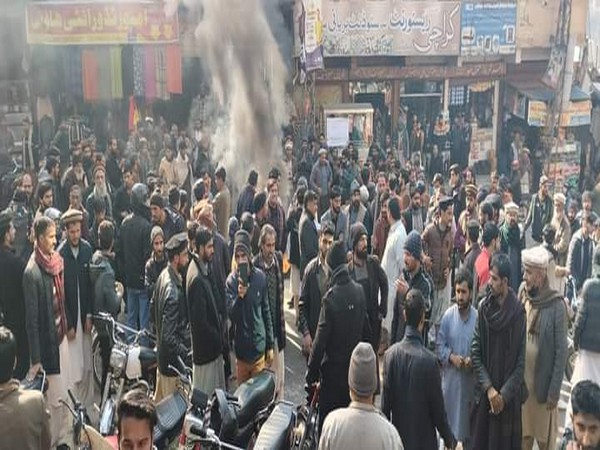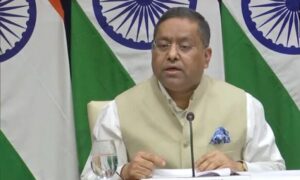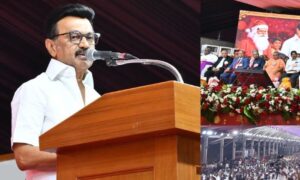
Picture : ANI/ X
Inflation is hitting hard to Pakistan and Pakistan occupied Kashmir (PoK). The recent violence which erupted a few days ago when about 70 members of the Joint Awami Action Committee, an organisation led by traders in the region, were arrested during a strike protesting against the rising costs of food, fuel, and utilities. Pakistan’s economy has been witnessing extremely high inflation and dismal economic growth for more than two years due to rising energy costs. The Russia-Ukraine war has further made the situation more complex.
The traders are hardest hit. With a complete halt on trade with India, and rising electricity and food prices is causing double whammy on them. A general strike halted Muzaffarabad, the capital and largest city of PoK, as public transport, shops, markets, and businesses shut down. As the large numbers of protesters clashed with police in the Mirpur and Muzaffarabad divisions, the paramilitary Rangers were called in to secure government buildings such as the legislative assembly and the courts. Further, after India raised customs duty to 200% on Pakistani products such as dry dates, rock salt, cement, and gypsum following the Pulwama terror attack of February 2019, Pakistan’s exports to India fell from an average of $45 million per month in 2018 to only $2.5 million per month between March and July 2019. The situation worsened after Pakistan stopped all trade following the implementation of Article 370 August 2019. India-Pakistan trade has shrunk to a low of about Pakistan’s economy has been witnessing extremely high inflation and dismal economic growth for more than two years due to rising energy costs.
According to the Pakistan newspaper, Dawn, consumer inflation has been above 20% since May 2022, and touched 38% in May 2023. $2 billion annually over the last five years, a small fraction of the $37 billion trade potential estimated by the World Bank.
Not only traders, leaders in PoK have been protesting alleged discrimination by the government in Islamabad in the distribution of power to the area. Prime Minister of PoK, Chaudhry Anwarul Haq complained about not receiving their fair share of the 2,600MW of hydropower produced by the Neelum-Jhelum project. Haq also pointed out that his request for resources to increase salaries of government employees in the recent budget was not accepted, and that he had been forced to divert development funds to pay them.
“Deeply concerned” by the unexpected protests, Pakistani Prime Minister Shehbaz Sharif recently approved PKR 23 billion for immediate release to the region after negotiations between protesters and the regional government ended in a deadlock. Sharif also chaired a special meeting, which was attended by Haq, local and federal Pakistani ministers, and leaders of the coalition parties, for a detailed review of the situation. He further added that there should be absolutely no tolerance for taking the law into one’s own hands. He had urged all parties “to resort to a peaceful course of action” for resolution of their demands.
Meanwhile, Pakistan’s President Asif Ali Zardari urged to exercise restraint and that peaceful dialogue and mutual consultation will help resolve the issues. Zardari added that to prevent hostile elements from exploiting the situation, political parties, state institutions and the people of the region should act responsibly, stressing that the demands of the people in PoK should be addressed according to the law. Zardari also expressed regret over the current situation in the region and offered condolences over the death of the police officer.
On the other hand, with India undergoing general elections, PoK has become one of the agendas for the BJP. Union Home Minister Amit Shah reiterated that Pakistan-occupied Kashmir (PoK) is a part of India. “We have rights over it. No one can deny that,” he said. When asked if India has taken any “pro-active steps” towards the PoK issue, Shah said, “They will be taken at the right time.” He said the BJP believes that Pakistan-occupied Kashmir belongs to India and only India should get it.
Recently, in an election rally in West Bengal, Shah said Congress leader Rahul Gandhi and West Bengal Chief Minister Mamata Banerjee can fear Pakistan if they want, “but this PoK belongs to India and we will take it.”
Echoing on the same lines, External Affairs Minister (EAM) S Jaishankar reiterated India’s stand on merging the illegally occupied region. Jaishankar said that “one day we will end the illegal occupation of the PoK and PoK will join with India.”
[the_ad id=”55724″]


















